Flaming Star (1960)
Elvis Presley, Barbara Eden, Steve Forrest, John McIntire, Dolores del Río, L.Q. Jones, Richard Jaeckel and Rodolfo Acosta.
Director Don Siegel
20th Century-Fox (92 mins)
Pacer Burton (Presley) is a “half-breed”. His father, Sam (McIntire), is a white man who already had a son, Clint (Forrest), when he met Neddy (del Río), a Kiowa Indian. Sam and Neddy married and had Pacer and the four live together on their homestead in Texas where trouble with the Kiowa tribes is mounting. After a party at the Burton’s, a white family is wiped out by a band of Kiowas.
The new Kiowa chief, Buffalo Horn (Acosta), comes to talk to the Burtons to see where they stand in regards to the coming conflict. He is told the Burtons are peace-loving people who want to be left alone. When Pacer and Clint go into town for supplies, they hear the sad news about their friends getting massacred and they are told they are no longer welcome at The Crossing. When the Burton boys relate the situation to their parents, the family bonds in love, determined to live peacefully. However, a band of men from town ride up and they – like Buffalo Horn – demand to know where the Burton’s sympathies lie. The Burtons again reiterate that they are for peace but the hostile band of men are not having it.
Later, Pacer and Neddy are home alone and two white trappers stop by for sustenance. When the trappers realize that these “Indians” actually own this house they become belligerent. Neddy rebuffs their advances and Pacer goes savage and pounds them, driving them away. In a cute moment, Pacer comes back in the house looking like he’s been in a fight but claiming to have fallen down. “You fell pretty hard on your knuckles”, Neddy says and the two embrace. Neddy abhors violence but is thankful that Pacer dealt with the men. This ordeal, though, convinces Pacer that it may be the white men who are the savages.
Neddy wants to fix things with the Kiowa tribe and Pacer takes her to see her people. She is unsuccessful but Pacer’s interactions with Buffalo Horn and the other Indians further inspire him to join their fight. On the way home from the Kiowa camp, Pacer, Neddy and their Kiowa guide, Pacer’s old friend Two-Moons (Perry Lopez), are ambushed by Will Howard (Douglas Dick). Howard was wounded in the initial Kiowa attack but escaped and has been stumbling around, half-dead, for days. Howard kills Two-Moons and wounds Neddy before Pacer kills him.
Pacer and Clint head to town for a doctor for Neddy. The townspeople forbid the doctor to go so Pacer puts a gun to the head of the doc’s little daughter to force his hand. In a nice touch that reveals Pacer’s character, he whispers to the little girl “you know I won’t hurt you, honey”. The Burton boys, Clint’s girl, Roslyn (Eden), and the doc get to the house but it is too late; Neddy has seen the “flaming star of death” and has walked off to the bush to die. Sam has found her and is disconsolate. Pacer gets mad at the doc, saying his reluctance to come and help cost Neddy her life. Pacer and Clint end up fighting and Pacer leaves – after a touching goodbye with his father – to join Buffalo Horn and be with “his people”.
Pacer tells Buffalo Horn that he is joining the Kiowas on one stipulation: he will not fight his father and brother. Buffalo Horn agrees. However, a renegade band of Indians coming to join Buffalo Horn stumble on Sam Burton. They kill him and injure Clint severely. Pacer fights with these Indians, killing some of them, and gets Clint back to the homestead. When Pacer learns his father is dead he straps Clint to his horse and sends him to town and heads off to settle his score with the Kiowas.
Flaming Star was Elvis Presley’s sixth film and it finds him in a rarified air. He was still at this point hoping for a serious acting career and 20th Century-Fox was giving him his chance. He came back from the Army and immediately starred in the crowd-pleaser G.I. Blues but Fox had other plans which excited Presley. He would stick with the studio for one more film but neither of these two fine dramas packed them in like G.I. Blues before them or Blue Hawaii right after them. So the die was cast. Thankfully, he was given the chance to make a film like the one we’re talking about today.
Don Siegel (1912-1991) had apprenticed as a montage director (Casablanca) at Warners before he directed his first film, a delightful short concerning Christmas called Star in the Night. He would then direct many films including Invasion of the Body Snatchers (1956) and Hound Dog Man with Fabian in 1959. He would make his name in the 1970’s working with Clint Eastwood directing Clint in five films and also helming John Wayne’s last film, The Shootist (1976).
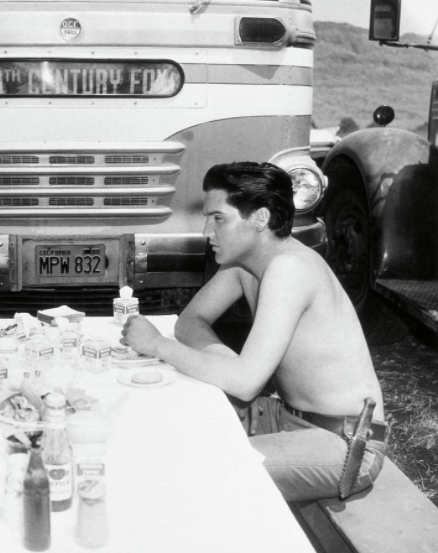
Clair Huffaker was a writer on who’s 1958 novel Flaming Lance this film is based. Huffaker adapted his book for the screen with the help of Nunnally Johnson. While Huffaker can claim the scripts for The Comancheros (1961), The War Wagon (1967), Hellfighters (1968) and 100 Rifles (1969), Johnson trumps him with his long career in Hollywood scripting films like The Grapes of Wrath (1940), The Woman in the Window (1945), Something’s Got to Give, Marilyn Monroe’s aborted final film and The Dirty Dozen (1967). In addition, Johnson was a director of some note helming The Man in the Grey Flannel Suit (1956) and the following year’s The Three Faces of Eve. So, there is substantial pedigree behind the scenes of Flaming Star. Consider also that in this project’s infancy Frank Sinatra and Marlon Brando were to play the Burton boys.
Barbara Eden is fetching as Clint Burton’s britches-wearing girl. Flaming Star marks her first significant film appearance and she would go on to marry Michael Ansara, a prolific actor who took his turn alongside King in 1965’s Harum Scarum. Apparently Barbara Steele had the role until she had disagreements with director Siegel. Steve Forrest had been little used and little noticed in various films by the time he was cast as Pacer’s white brother, Clint, in our film. This was a role Robert Wagner had turned down, wisely stating that no one notices anyone else in a King Movie. Forrest makes a good appearance here, though, and does well. Forrest is best remembered for starring in both seasons of the TV show with perhaps the greatest theme song ever, S.W.A.T. (1975/76).
Dolores del Río was “the first major female Latin American crossover star in Hollywood”. She began her career in 1925 and made many films in the States – and had a relationship with Orson Welles – before returning to her native land. She was coerced back to Hollywood after almost 20 years to star as Presley’s mother in Flaming Star and she plays the role of the Kiowa woman named N’edd’ee-pahs well. Del Río’s final film role was in The Children of Sanchez (1978). I was shocked the first time I saw John McIntire play a mean guy as he did in The Far Country (1954) because I had only seen him play the gentle and honourable Sam Burton. McIntire had a long career during which he showed up in many notable films before replacing Ward Bond on television’s Wagon Train upon Bond’s death in 1961.
L.Q. Jones was born Justus Ellis McQueen, Jr. in 1927 and is still with us as of this writing. A notable actor in westerns, he can also be seen with Elvis in Love Me Tender and Stay Away, Joe. He can also be seen in Martin Scorsese’s Casino (1995). Richard Jaeckel is another member of our cast that made appearances in many popular films eventually earning an Oscar nom for 1972’s Sometimes a Great Notion. He can also be seen having an axe fight with Frankie Avalon in Blood Song (1982).
The Look: Not much to talk about here as this is a period western. 25-year-old Elvis Presley looks great, though, in Flaming Star. His hair is perfect and he is obviously in good shape as evidenced by his shirtless adventures near the end of the film. He’s been dressed in suitable western clothes and he looked good enough to be noticed by Andy Warhol who used a publicity still from this film to create several silkscreens, the sales of which have exceeded $345 million.
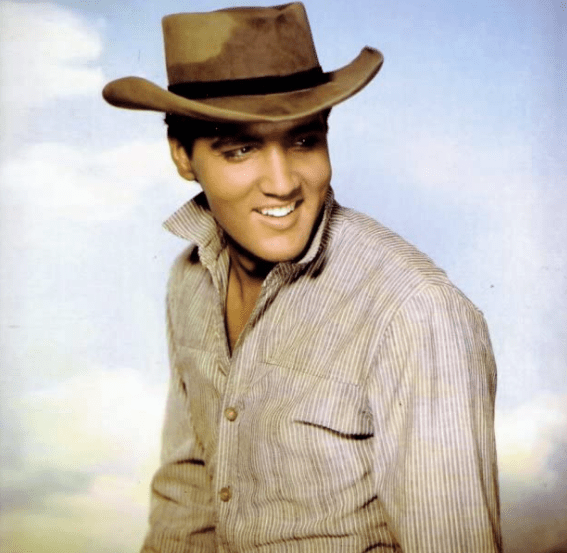

King Moment: Presley managed to sneak in a little magic. Pacer has fun with his brother but generally – through the events of the film – he is pretty serious but can let a little mischief peek through. Sitting around the house, the family speculates as to the cause of the local Kiowas being stirred up. Pacer remains silent while the three others question each other and try to come up with answers. Pacer finally suggests that it may be because they have a new chief, a development that is news to the family. When he is asked how long he’s known about this, Pacer replies “since it happened”. When his father, comically exasperated, asks if Pacer tells anybody anything, Pacer – and here’s where Elvis really shines through the character – says “not if they don’t ask me” with a priceless grin.
The Music: “Flaming Star”, “A Cane and a High-Starched Collar”
Again, there’s not much to say in this category as Flaming Star is not a musical in any way, shape or form. There’s nothing wrong with the title track; it is a solid “movie song”. A version using the early title “Black Star” has been released and I have read of connections between this alternate tune and David Bowie’s final album Blackstar but I don’t see it. The fact that the two singers share a birthday does little to solidify this link-up. Many of us own the Elvis album Elvis Sings Flaming Star from 1969, the first of Presley’s released on the budget Camden label. “A Cane and a High-Starched Collar” is a song sung at a party at the beginning of the film and it works fine but was totally unnecessary. Interesting to note that while the song is being sung, Richard Jaeckel, who obviously “can’t find a partner” to dance with, “use(s) a wooden chair”.
Mercifully, two other songs that were recorded for the film were not used. “Britches” is a trite tune and a good example of nothing more than a “plot device” song; no doubt it was to be used to comment on the fact that Roslyn wears pants. “Summer Kisses, Winter Tears” is a pleasant song that doesn’t suffer by not necessarily sounding like it’s a tune from the 1870’s.
Meanwhile in Elvis World: When Elvis Presley was first approached by Hollywood, a deal was struck with 20th Century-Fox. The deal was for one film – which became Love Me Tender – with an option for two more. Shortly before Elvis was to go into the Army, the shifty Col. Tom Parker placed some items in the trades that suggested that he wasn’t sure for whom Elvis would make his next picture, to be made in 1960 upon King’s release from the Armed Forces. These items irked both Fox and Hal Wallis; both the studio and the independent producer who worked with Paramount assumed that the contracts they had with Colonel stipulated that they be the recipients of Elvis’ next film work. Fox, of course, intended to pick up their option for two more films but, as it turned out, Wallis was next up and Presley appeared for him in his first post-Army film, G.I. Blues.
After Wallis presented Elvis the entertainer in the family-friendly G.I. Blues, Fox got their turn and they were convinced that a serious picture with Elvis putting in a strong dramatic performance would draw a wide audience. David Weisbart had produced Rebel Without a Cause and when he worked with Elvis on Love Me Tender, the producer had been impressed with both King’s performance and his demeanour. From the outset, Weisbart had envisioned Flaming Star to be a showcase for Elvis’ acting skills but he knew he would have a fight on his hands if he was to keep songs out of the picture. Before filming began, Weisbart wrote that he could not “see how it is possible for Elvis to break into song without destroying a very good script”.
During a subsequent meeting with Col. Parker, Weisbart was told the facts of life. Parker explained to Weisbart the old adage: the movies sell the records and the records sell the movies. When Weisbart began to play ball and solicited Elvis’ music publishers to find decent songs that sounded like they would’ve been sung in 1878, when the film was set, Colonel balked again. How could an old ditty played on acoustic guitar and a jug, maybe, be a hit?! In a telling correspondence with Weisbart, a Fox vice president stated: “I think Parker is more interested in selling records than he is (in) building a motion picture career for Presley…too bad.”
Eventually, Weisbart enjoyed a victory of sorts. Four songs were recorded for Flaming Star but only two were used; the title song over the opening credits, which was fine and “A Cane and a High-Starched Collar”, which was sung at a party so it came off as a legitimate place to include a number. But that was it. Six minutes into the film and the songs were done.
Elvis unfortunately did not forge a good relationship with director Don Siegel. Siegel claimed that the problem was a common one in Elvis World; the director could never be alone with his star. As usual, Elvis’ full entourage was in attendance during filming and the boys would often spend valuable time playing touch football in the searing heat at the Conejo Movie Ranch in Thousand Oaks. Sonny West recalls the director was dumfounded that the boys had such energy. “It was the uppers”, Sonny said.
Elvis scholar Peter Guralnick has said that the disconnect between director and star showed up in the finished product. Elvis seems to have little of consequence to do and the story seems unsure of what exactly it is saying. Is the message one of racial tolerance or is it the strain of being culturally marginalized? I tend to disagree with Mr. Guralnick – however, if you tell him so I will deny it. Flaming Star came from a novel; a “serious” source. The story it tells is poignant; the four people in this family are tight-knit and love each other. Conditions drive a wedge into their midst and it hurts them dearly, eventually ripping them asunder. That’s a significant tale and I think it’s handled well.
There are many interesting moments. The script establishes Neddy’s kind character more than once. When the Burtons are mourning the loss of their friends, massacred by Kiowas, Pacer bluntly reminds all that the friends would have been dead years ago if Neddy had not nursed them through “the plague”. Neddy is obviously a loving part of the community, always ready to help her friends and strangers. When two trappers stop by the home in dire need of food, Neddy – home alone with Pacer – invites them in. The change in demeanour the trappers exhibit when they find their hosts are Indians is striking. Neddy pays it no never mind and continues preparing a meal.
Pa Burton has a nice speech early on when it is suggested that the family may be torn up by this war. He talks of the love he has for Neddy as her sons gather around her. It is also notable to watch a scene in which Elvis interacts lovingly with a “mother”, knowing what we all know about the loss he suffered when Gladys died. There’s a poignant moment between Pacer and his father when Pacer decides to join the Kiowas. McIntire plays Pa Burton as a wonderful man, a loving husband and father. Another moment subtly but significantly reveals the nature of the relationship between the brothers, Pacer and Clint. When a doctor won’t come to help Neddy, Clint gets an idea. All he says to Pacer is “you saw that kid playing back of Doc’s house?”. Pacer simply answers “I can do it”. He grabs the little girl at gunpoint to get the Doc to come and help. Pacer and Clint know each other so well that Pacer instinctively knew what Clint was thinking.
And how much does Clint love his brother? When he wakes up in bed at The Crossing where he has been treated for his injuries, he immediately gets dressed to go find what has happened to Pacer. He’s told the doctor says he shouldn’t move. “You think I’m gonna stay here?”, he says disgustedly. That’s how he feels about these people. The best though is when Roslyn’s father (Karl Swenson) comes in acting like nothing’s amiss. Clint ignores him until he tries to stop Clint going. “You wanna get shot?” he asks. Beauty. It shows where his loyalties lie; with his family and not with whites or Kiowas.

In many ways, Flaming Star is not really a “King Movie”. It is very different from the run-of-the-mill romp Elvis is known for. It was a period-piece based on a novel. King played a character of mixed heritage and – significant and rare in Elvis World – his character has a family, a mother and father. One of the hallmarks of Presley’s film career is that he played characters who were either without parents or who were struggling with or against parents. Another way it differs greatly is the body count! We could discuss the savage nature of Elvis’ screen persona in his early films but this one beats them all. Pacer wallops the two trappers. The one gets a rifle butt in the jaw; imagine what that can do to a man’s face. The other trapper gets it worse. Pacer stabs the guy and when the guy begs for mercy, Pacer hits him yet again and then pounds his head against a wall! When crazy Will Howard opens fire on Pacer, Neddy and Two-Moons, Pacer kills him – that’s one kill. When he begins to fight the Indians that have attacked his brother and killed his father, Pacer kills at least three others. I mean, yes, it’s a western. But Wallis had King babysitting and singing to children while in the very next film he’s killing four men! Also worth noting is a couple rarities; Elvis doesn’t have a girl in this film and Elvis’ character in Flaming Star meets his end. We can assume he dies though we don’t see it on screen.
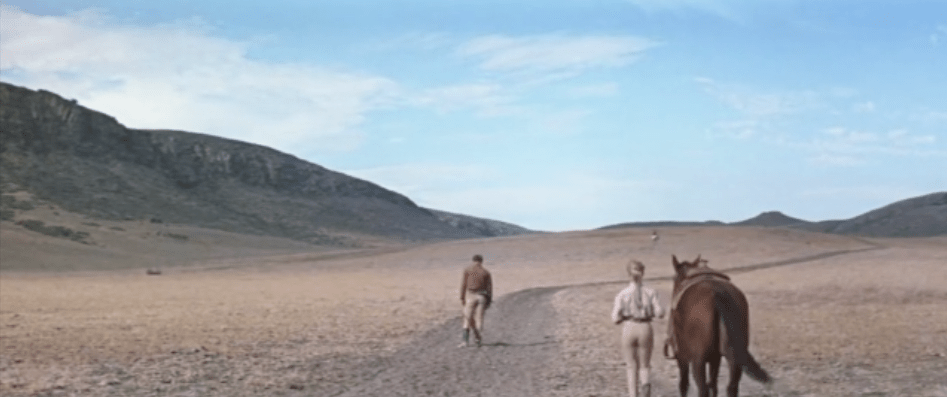
Flaming Star is perfect for fans of westerns and classic films who may not feel that King Movies are for them. It has a good cast and a great story and by using a realistic location and stunning photography, it all plays out well. It’s a common lament in Elvis World but it’s too bad Presley didn’t get more chances like this.
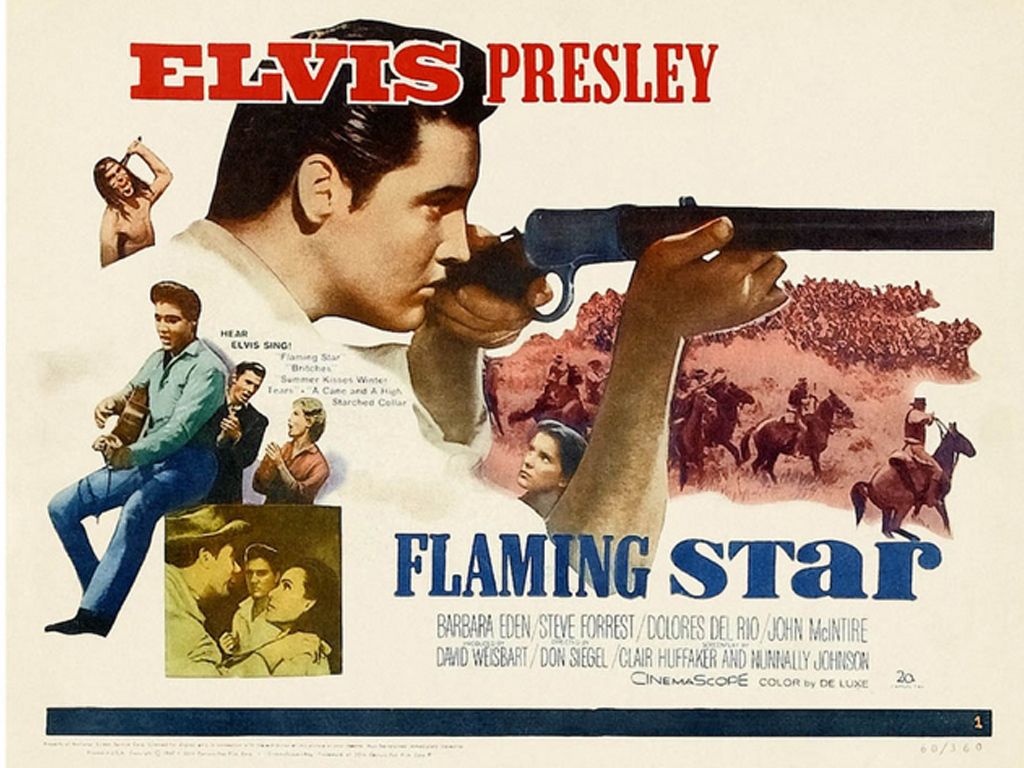

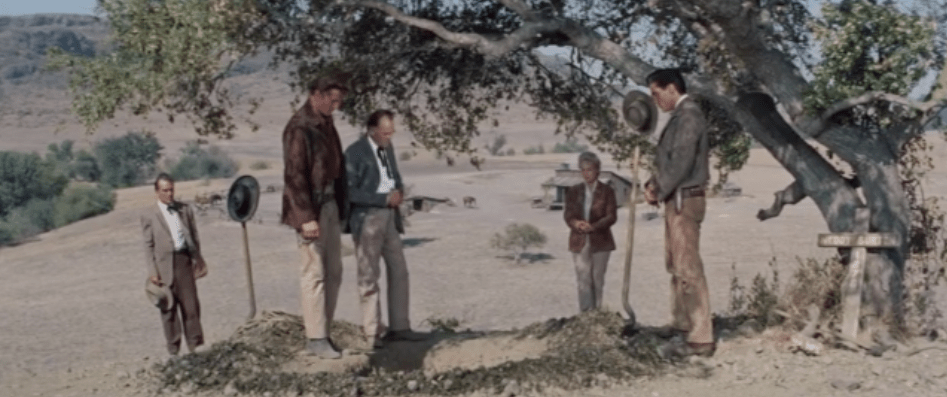
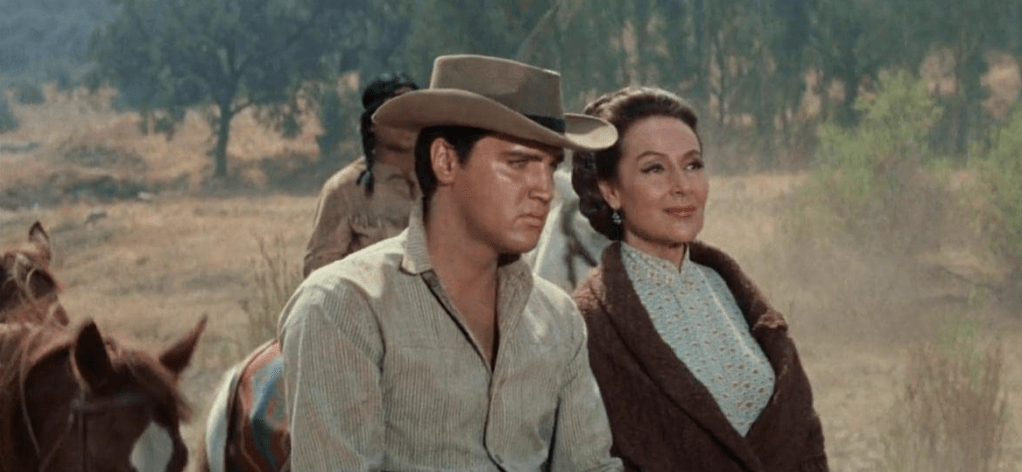
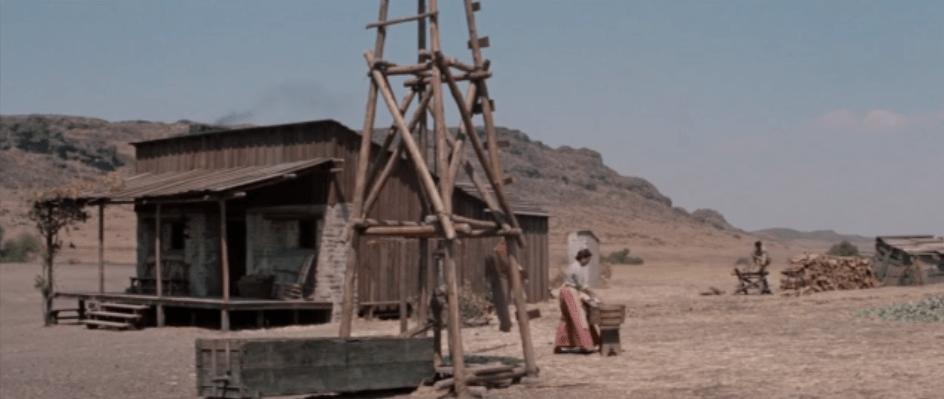
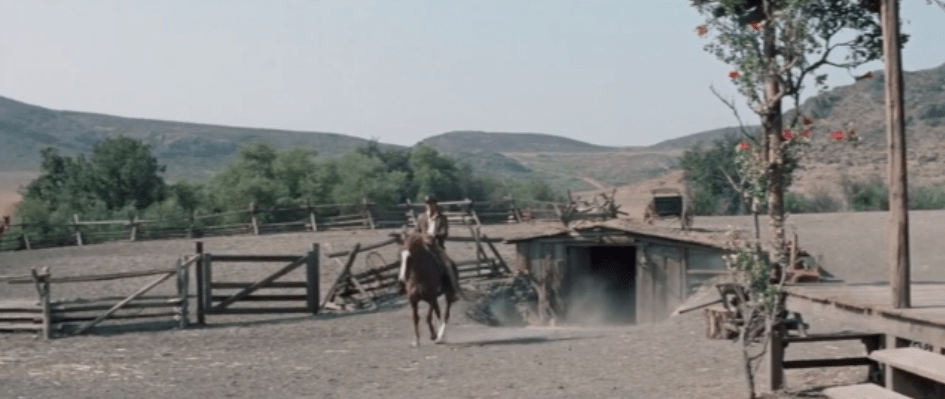
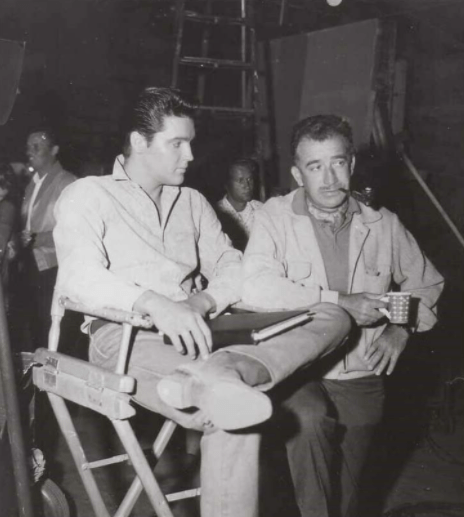
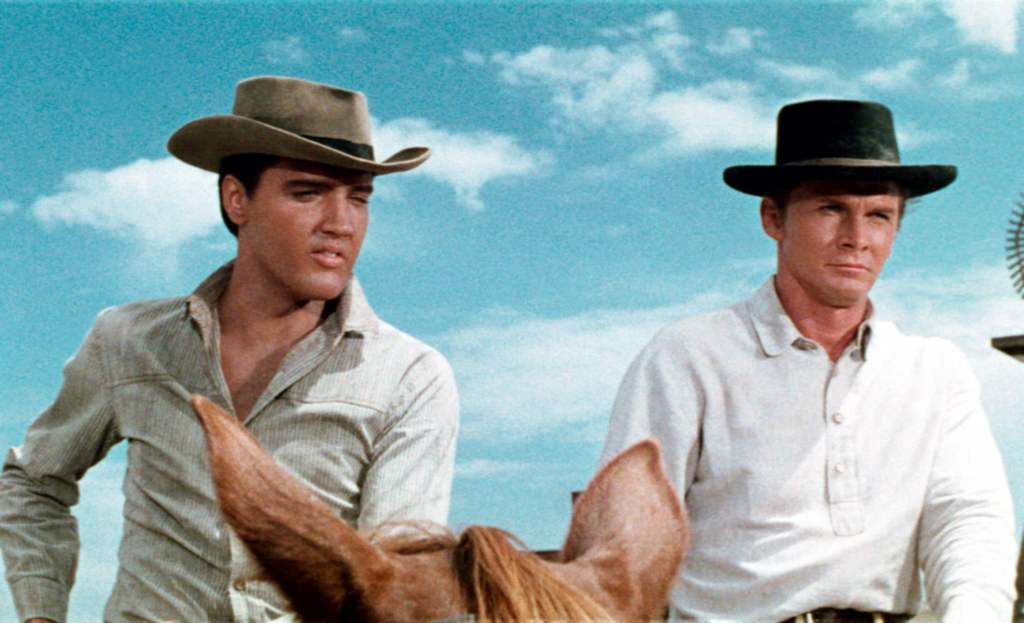
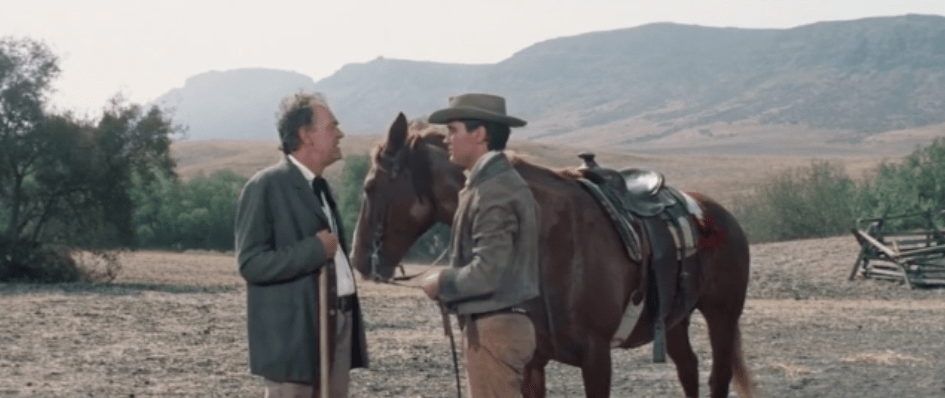
I’ve got mixed feelings about Elvis’ films although after reading this I’d be interested in see the film again. Don’t think I’ve seen it for many years. Just out of interest, Steve Forrest was the brother of Dana Andrews and is best remembered in the uk for his TV series ‘The Baron’.
My friend, your mixed feelings are perfectly justified. To look at them askance is legit; to dismiss them out of hand is folly as one robs oneself of some good fun. I was surprised to learn that Steve Forrest didn’t really get up to much in his career. Good shout about his brother, Dana. I had gapped on that.
Great analysis as usual. You make a great point about the lack of opportunity to develop a wider dramatic body of work while within the clutches of Colonel Parker and Hal Wallis. It occurs to me that this could very well have been a film that Wallis might have wanted to make – except he would have funded it with the money from an Elvis musical and cast someone else.
I wonder also if Elvis’ lack of opportunity was as much about the state of the studio system by this time. Imagine, for instance, what might have been possible if someone with the vision of Irving Thalberg, with all the safety of a huge and profitable studio to work with, could have steered Elvis’ movie career. JJ Cohn, an MGM executive, said that in those days it was more important to develop a star than make money on a individual picture. But by the 60s that whole system was in disarray – producers were less willing to take any kind of chance because one failure could sink an entire studio. (As Fox was about to find out with Cleopatra). Was it as much about timing, as it was Colonel Parker’s judgement and Hal Wallis’ opportunism?
I love your reference to Wallis using “Elvis Money” to make quality pictures! And your point is legit about Hollywood at the time. It sure was basically a film-by-film basis sort of situation so better not take any chances. Under the Studio System, Elvis may have been tried out in many different roles in various films without the danger of much damage being done by one of them flopping. Basically, though, I think it comes back down to what will the public accept from you? What types of films will bring the kids out in droves? A guy like Burt Lancaster was going to be allowed to stretch and experiment but Elvis was doomed from the start, I think. “Just sing, boy”.